STE(A)M EmbRaCe aims to promote inclusion by engaging and inspiring students from different backgrounds. Students work on real-world STE(A)M problems, which will help develop their cultural empathy, resilience, and creative thinking. The idea is to create digital content which will be ready to be used by teachers in any classroom setting. More specifically, the project will allow the development of a 7-week course and teacher training on how to use the developed material with students.
Learning Scenarios
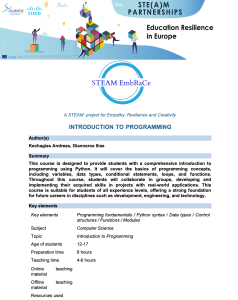
INTRODUCTION TO PROGRAMMING
This course is designed to provide students with a comprehensive introduction to programming using Python. It will cover the basics of programming concepts, including variables, data types, conditional statements, loops, and functions. Throughout this course, students will collaborate in groups, developing and implementing their acquired skills in projects with real-world applications. This course is suitable for students of all experience levels, offering a strong foundation for future careers in disciplines such as development, engineering, and technology.
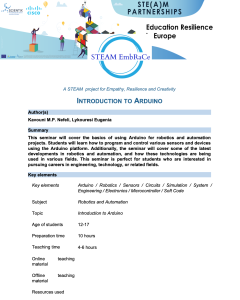
INTRODUCTION TO ARDUINO
This seminar will cover the basics of using Arduino for robotics and automation projects. Students will learn how to program and control various sensors and devices using the Arduino platform. Additionally, the seminar will cover some of the latest developments in robotics and automation, and how these technologies are being used in various fields. This seminar is perfect for students who are interested in pursuing careers in engineering, technology, or related fields.
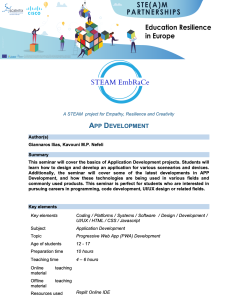
APPLICATION DEVELOPMENT
This seminar will cover the basics of Application Development projects. Students will
learn how to design and develop an application for various scenearios and devices.
Additionally, the seminar will cover some of the latest developments in APP
Development, and how these technologies are being used in various fields and
commonly used products. This seminar is perfect for students who are interested in
pursuing careers in programming, code development, UI/UX design or related fields.

INTRODUCTION TO 3D PRINTING
This lesson is designed to introduce teens to the basics of 3D printing. Participants will learn how 3D printing works, how to use 3D modeling software to design objects, and how to operate a 3D printer. The lesson will also cover safety considerations and best practices for using 3D printers.

INTERNET OF THINGS
This seminar is designed to give the students a foundation on the notion of Internet of Things, including the components, tools and analysis by teaching the concepts behind the IoT and a look at real-world solutions. Students will understand the definition and the significance of the IoT, will discuss the architecture, the operation and the business benefits of an IoT solution. Moreover, the program will give the opportunity to the students not only to explore the rela- tionship between IoT and cloud computing by monitoring real-time data in a low code plat- form, but also to learn about the basic communication protocols.
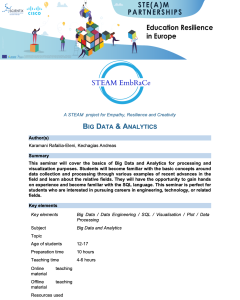
BIG DATA & ANALYTICS
This seminar will cover the basics of Big Data and Analytics for processing and visualization purposes. Students will become familiar with the basic concepts around data collection and processing through various examples of recent advances in the field and learn about the relative fields. They will have the opportunity to gain hands on experience and become familiar with the SQL language. This seminar is perfect for students who are interested in pursuing careers in engineering, technology, or related fields.
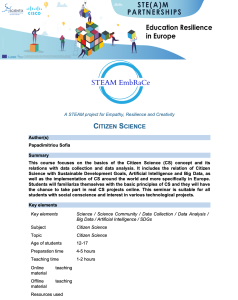
CITIZEN SCIENCE
This course focuses on the basics of the Citizen Science (CS) concept and its relations
with data collection and data analysis. It includes the relation of Citizen Science with Sustainable Development Goals, Artificial Intelligence and Big Data, as well as the implementation of CS around the world and more specifically in Europe.
Students will familiarize themselves with the basic principles of CS and they will have
the chance to take part in real CS projects online.
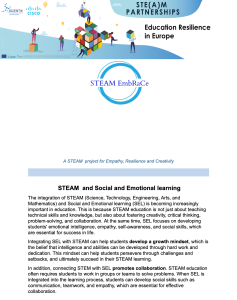
SOCIAL AND EMOTIONAL LEARNING
The integration of STEAM (Science, Technology, Engineering, Arts, and Mathematics) and Social and Emotional learning (SEL) is becoming increasingly important in education. This is because STEAM education is not just about teaching technical skills and knowledge, but also about fostering creativity, critical thinking, problem-solving, and collaboration. At the same time, SEL focuses on developing students’ emotional intelligence, empathy, self-awareness, and social skills, which are essential for success in life.
What’s next for this project?
What’s next for this project?
Thanks to the Scientix STE(A)M Partnership Education Resilience in Europe support STE(A)M EmbRaCe plans to:
→ create materials and activities that will be part of the future course which can be easily integrated in the school curriculum of any country;
→ organize three workshops for teachers, students, and parents;
→ test the created STE(A)M activities in 3 classes;
→ translate the produced materials into English and disseminate them to teachers across Europe.
Thanks to STE(A)M EmbRaCe, teachers will have access to innovative resources for inclusive STE(A)M education, while students will get a chance to improve their STE(A)M key competences.
About the Scientix STE(A)M Partnership Education Resilience in Europe
About the Scientix STE(A)M Partnership Education Resilience in Europe
The Education resilience in Europe initiative, supported by the Scientix STE(A)M Partnerships and funded by Cisco, aims to identify, and support projects which address the challenges encountered while integrating students from different cultural and language backgrounds. The selected projects will develop best practices and provide tools for a smoother integration of students, and, finally, share the results with interested stakeholders.
Scientix is the community for science education in Europe and its STE(A)M Partnerships promote collaboration between Ministries of Education, schools, teachers, and other stakeholders to develop research and testing initiatives for new approaches for creative and innovative STEM teaching and learning opportunities.
More information on the initiative, here.
For more information on STEAMing the Future online courses you can contact the Anatolia College STEM Center at
stem@anatolia.edu.gr or 2310 398289

